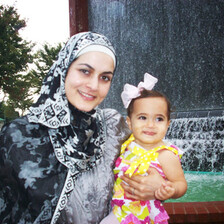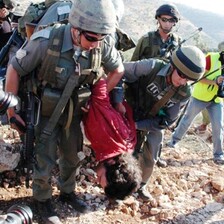Al Jazeera 28 July 2005
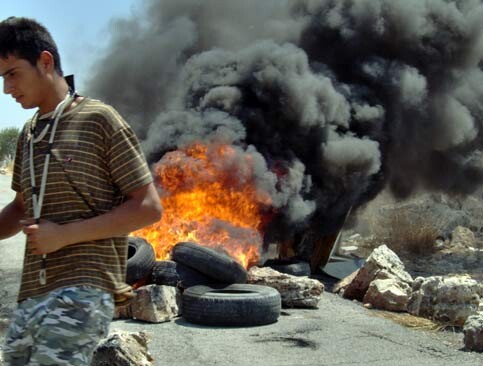
(Photo: Karolyn Hijazi)
Palestinians have burned rubber tyres along the trail of the Israeli separation barrier in the West Bank in a symbolic protest against its ongoing construction under the smokescreen of the Gaza pullout.
Black smoke seen rising along the wall’s path from the areas of Marda to Qalandia in the Central West Bank on Thursday was an “SOS to the world” to take action to stop Israel’s annexation of their land and “imprisonment of the Palestinian people”, according to Ayed Morrar, coordinator of the Popular Committee to Resist the Wall in Ram Allah.
“The black smoke symbolises everything negative that the Wall is doing to us - killing, transfer, choking, imprisonment. Behind the smokescreen of the Gaza disengagement, the very foundations of peace are destroyed as the apartheid wall continues to be constructed to the deafening silence of the international community,” 43-year-old Morrar told Aljazeera.net.
“This is a call, an SOS we are sending to the world, to save the Palestinians from these dangerous effects of the wall. We are trying to show that while the wall is being built in certain villages, it affects everything and everyone in the surrounding areas, just like the black smoke,” he added.
Protestors shot
Israeli forces shot at protesters who were trying to light the tyres in the villages of Biilin and Budrus, injuring six Palestinians and one Israeli activist, witnesses said.
The injured included 15-year old Ribhi Khatib, shot in the back, and 15-year-old Rashid Abu-Rahma, shot in the leg. Both sustained light wounds, according to witnesses.
“We were about 300m away from the wall, getting ready to burn the tyres, and the Israeli military backed up with armoured bulldozers who seem to have been waiting for us there began to fire at us with rubber bullets, injuring two men in the foot and hand,” said Muhammad al-Khatib, community leader and member of the Popular Committee in Bil’in.
“The Israeli forces then raided the village centre, where they fired at residents and set off tear gas and sound bombs,” he added.
Al-Khatib says the Israeli military regularly attacks the peaceful protests with teargas, clubs and rubber-coated steel bullets.
In similar protests two weeks ago, Israeli forces shot dead a Palestinian boy and injured 18 others, two of them seriously.
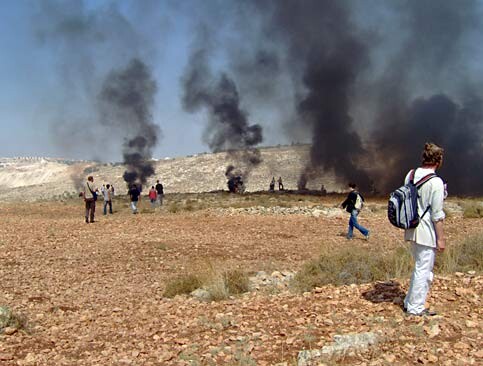
(Photo: Karolyn Hijazi)
In an advisory opinion issued in July 2004, the International Court of Justice in The Hague ruled the path of the wall Israel is building to be illegal.
Tel Aviv has so far refused to abide by the court’s decision, contending that it did not have jurisdiction to hear the matter, according to the Israeli human right’s group B’tselem.
Leaders targeted
The Palestinians of the Salfit, Ram Allah and northwest Jerusalem villages say the Israeli military has been targeting Palestinian leaders of non-violent resistance in recent weeks.
In the village of Biilin, where the separation wall will isolate more than 60% of the lands of Bil’in if completed, local leader and founder of the Popular Committee Against the Wall Abd Allah Abu Rahma was arrested in a non-violent protest on 15 July 2005.
A judge at Ofer military base on Tuesday ruled that Abu Rahma was “too dangerous” to be released on bail and that he would be held until the end of the proceeding against him.
The group has routinely organised themed non-violent demonstrations after Israeli courts refused appeals to prevent the wall’s construction five months ago.
In recent weeks, villagers constructed mock scales to symbolise injustice, and built large cages representing the “caging in” of their village.
At the time of his arrest, Abu Rahma was inside a large prop constructed to look like a bridge that carried a banner which read “peace needs bridges not walls”.
New Ghandis
In an interview earlier this month before his arrest, Abu Rahma told Aljazeera.net that the Bil’in villagers considered themselves “the new Ghandis”, and that the Israeli military regularly showed up at the protests and attempted to provoke the youth.
“Every protest has to have a goal and a new theme so the world can see that there is a small village in Ram Allah whose land is being annexed and that it is being oppressed.
“We try to use new methods of resistance and try to carry the message to regular Israelis to show them that we don’t hate them. I am a Palestinian who does not hate human beings, only oppression and occupation,” Abu Rahma said.
According to the evidence provided by the prosecution, he was arrested shortly after making the statement “I’m not leaving, this is my home. You go back to Tel Aviv.”
He has been charged with assaulting a police officer, incitement and disrupting public order.
Prior to his arrest, Abu Rahma told Aljazeera.net he was detained and interrogated by Israeli secret service agents in the middle of the night.
“They came for me in the middle of the night just to intimidate me so we will stop our non-violent protests against the wall,” he said.
Abu Rahma’s older brother, Ratib, was also arrested and later released due to insufficient evidence against him.
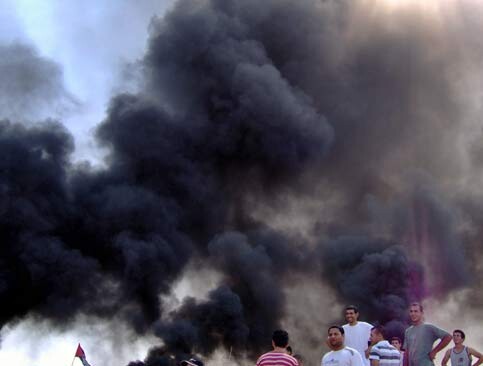
(Photo: Karolyn Hijazi)
Laila M. El-Haddad is a journalist based in the Gaza Strip. This article was originally published by aljazeera.net and reprinted on EI permission.
Related Links


